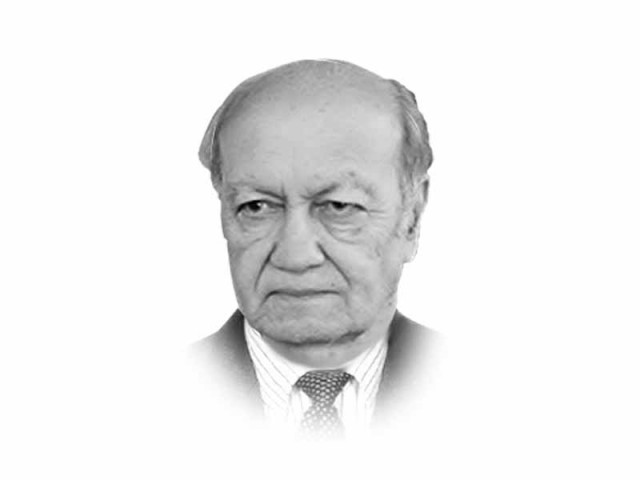Pakistan’s multiple woes
Placing blame on Hussain Haqqani and Afridi may be touching only the surface

The writer is a retired lieutenant general of the Pakistan Army and a former federal secretary. He has also served as chairman of the Pakistan Ordnance Factories Board
Haqqani claims the increase in the US assistance package demanded facilitating visas to US personnel. Apparently, our authorities were ignorant that the real purpose of expanding American presence was to track Osama bin Laden. The CIA operatives did eventually succeed in tracking him without involving our government.
What the whole episode about giving generous access to American personnel does reflect is that in Pakistan major national decisions are taken in a vacuum and are highly personalised! There is a reason for it, because contrary to normal democratic norms our political leaders are in the habit of taking decisions at a personal rather than in an institutionalised manner. Moreover, our military establishment influences major decisions relating to security and foreign policy. In this case, the US deliberately avoided involving Pakistan Army or civilian leadership. Americans never fully trusted our army and intelligence in the hunt for Osama as they thought their efforts could get compromised. Whereas the PPP leadership was keen to remain close to the US to balance its internal weakness in dealing with the military. Moreover, substantive financial assistance that had reached US$7 billion was an additional attraction. The embassy was liberal in issuing visas to US personnel, many of whom were CIA operatives tasked to hunt Osama. They had apparently disguised themselves both to stay away from the watchful eye of our intelligence agencies and also thought this posture would facilitate in their hunt for him. Despite the fact that there was an international obligation to assist in the hunt for Osama, Pakistan was not that pushed. Paradoxically, in Pakistan’s security priorities he did not figure that high. For this indifference, Pakistan has paid a heavy price in terms of international reputation and its negative domestic fallout.
We should be genuinely interested in drawing some serious lessons from the fiasco that Osama lived right under our nose for several years and we failed to discover him. Regrettably, it was the Americans, through a clandestine activity, who discovered his whereabouts and assassinated him.
We also need to examine the deeper problem of strengthening our flawed, undemocratic decision-making structures. Placing blame on Hussain Haqqani and Afridi may be touching only the surface. This is not to deny that their role is questionable. However, given the indifference towards institutionalised decision-making by our rulers it is hardly surprising that policy and decision-making of national import remain personalised and disjointed. It is this very weakness that prevents our state from conducting a true national strategy that results in facing these unpleasant problems frequently.
Until there remains absence of institutional decision-making and we continue to have lack of intellectual content we will always face a similar crisis. As our brief history reminds us that there were much larger challenges Pakistan had to face due to this adhoc policymaking. Our robust and willing participation in the Afghan jihad and impromptu acceptance of playing a pivotal role after the iconic events of 9/11, without weighing its full consequences, are other examples of this faulty decision-making. The Kargil adventure nearly pushed us into a war with India although by then both were supposedly nuclear states.
One can enumerate many instances where we have faulted in policy formulation and rationalised these blunders by scapegoating the military or civilian leadership for it. But what is unfortunate is that even our civilian leaders seldom adhere to democratic norms of decision-making. This gives further leverage to the military to influence decision-making. Such shortcomings could be largely offset if the government would resort to involving both parliament and cabinet in formulation and oversight of major national policies, as is the norm with major democratic countries.
In Pakistan, the overwhelming centrality of security as the primary driver of international interest has given enormous leverage and importance to the military. This phenomenon got a huge boost during the Soviet invasion of Afghanistan and has continued to date. We are repeatedly reminded that Washington looks at Islamabad through Afghan or Indian lens. The lopsided view of Pakistan, in which security remains the prime interest for the US and certain powers, has magnified its political problems. Foreign powers in the past have exploited this weakness and have even been circumventing the civilian leadership and directly communicating with the army.
Sadly, despite the enormous sacrifices that the army has made in its fight against terror and securing our borders, it remains under criticism by the US, India, Afghanistan and other foreign countries. Because they focus on the army’s perceived tolerance and relationship with the Haqqani network, Quetta Shura and Jaish-e-Mohammad. This has given India a pretext to use Afghan territory for using TTP and other dissident elements against us. In sharp contrast, there is not a word of disapproval that one hears from the US government or Congress about India’s policies towards Pakistan or its brutal suppression of the Kashmir resistance movement. On the contrary, there are powerful voices in Congress that are initiating legislation to penalise Pakistan. The reason for this biased approach is obvious. The US considers India a strategic partner and for them the TTP and other anti-Pakistan groups based in, and operating from, Afghanistan are not a target.
We can only come out of this vicious cycle through a major reappraisal of our foreign and domestic policies.
Published in The Express Tribune, March 22nd, 2017.
Like Opinion & Editorial on Facebook, follow @ETOpEd on Twitter to receive all updates on all our daily pieces.















COMMENTS
Comments are moderated and generally will be posted if they are on-topic and not abusive.
For more information, please see our Comments FAQ